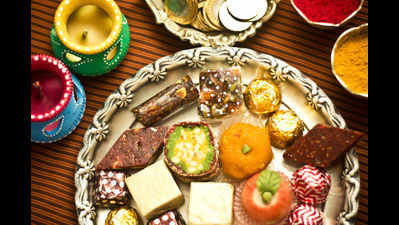- News
- City News
- chennai News
- <arttitle><b>Cheeni kum, Chennaiites!</b></arttitle>
Trending
This story is from October 19, 2016
Cheeni kum, Chennaiites!
How sweet are our traditional sweets?

How sweet are our traditional sweets?
The chairman and CEO of Pepsi, Indra Nooyi, has decided that by 2025 their soft drinks will have 100 calories less from the added sugars per (around) 350ml serving, and that their food products will have less of salt and fat content. The brand has already started experimenting with the formula with their lemon drinks by using stevia (a sugar substitute) instead of sugar, thereby reducing 30% sugar content in these drinks.But soft drinks aren’t the only way we rack up our sugar levels, which ultimately lead to health issues. With the festive season around the corner, and all of us gorging on mysorepak, gulab jamun, peda, jangiri and what not, we ask Chennai’s sweet-and-savoury makers, and those health-conscious, whether there is a way not to douse Indian sweets in oil, ghee and sugar, and yet, make the trademark sweets and savouries just as delish? Here’s what they have to say…
We work closely with a nutritionist to come out with healthier options
People are definitely becoming more health-conscious and they prefer healthier options even when it comes to sweets. That’s how we first introduced two of our sugarless items, dates and fig rolls, couple of months ago. Both the items have only natural sweetness of the fruits and have been in good demand since we introduced them. That made us think of two more flavours, cranberry and blueberry, which will be introduced for Deepavali. We work closely with a nutritionist and we’re hoping to come out with healthier options by next year.
— Mukesh Patel, director, Shree Mithai
Though the sweetener we use is about three times costlier than sugar, the sweets that we sell aren’t priced really high
We use a natural sweetener called levulose, which tastes like apple and is commercially made from beet/corn. All the other substitutes for sugar including, saccharin, cyclamate, sucralose, etc are artificial sweeteners and have been proved bad for health in the long run. If you look at the glycaemic index (GI) of levulose, it is only 19 as against the GI of sugar which is 65. Also, it is 1.7 times sweeter than sugar. So, the amount of the levulose needed for sweets is less and that again reduces the calorie intake. It helps keep blood sugar levels under control. We import the basic product, but our range of sweets is made using our patent technology. Though the sweetener is about three times costlier than sugar, the sweets that we sell aren’t priced really high. They may be 10% costlier than regular sweets that are available in other stores.
— K Ramu, chairman of Sundar Diabetics Dezire
We make kaju katli using dry fruits and honey
We’ve been selling a few products which are made of sugar substitutes for the last 10 years. But the demand wasn’t really good then. However, we see a steep increase in the number of people buying them in the last two-three years. Now, 5% of our total production are sweets made of sugar substitutes. And we expect it to go up to 20-30% in the next few years. Popular sweets like kaju katli are made using dry fruits and honey.
— Vishnu Shankar, director, Adyar Ananda Bhavan
At the end of the day, it is calories without any nutritional value
Despite the commendable move, I still think it’s still a bad idea to consume soft drinks. No matter how much percentage of sugar they reduce, it is essentially water flavouring in sugar. Also, it is calories without any nutritional value. It doesn’t hydrate you nor does it have any benefits. It simply has a sweet taste and gets one addicted to it. These drinks are bad for health and people should opt for coconut water or fresh juices instead.
— Ajit Sigamani, fitness expert
Reduction of salt and sugar will be beneficial for youngsters
The decrease of sugar from beverages and salt from food products is a welcome move. The consumption of soft drinks will have serious repercussions in the long run. The intake of such drinks, even in small quantity, isn’t advisable, especially for those who suffer from hypertension, liver-related and heart-related issues. These drinks contain zero calories and the manufacturers come up with marketing stunts often to attract consumers. Nevertheless, the reduction of salt and sugar will be beneficial for youngsters.
— Deepalekha Banerjee, city-based nutritionist
People who work out regularly are already averse to soft drinks
The sugar and salt content in aerated drinks and junk foods have always been one of the prime reasons for obesity and other issues. Yes, this decision of reducing their quantities in a soft drink is good news. It will benefit mostly those who aren’t into fitness and not health-conscious. A good sign among people who do regular workouts, including teenagers, is that they are completely averse to these soft drinks. So, this might not create much impact for them. They prefer fresh juices and other supplements. Earlier, drinking a soft drink was considered to be a cool thing among youngsters, but not anymore. For people who regularly consume such drinks, it’s high time they resorted to vaazhaithandu (plantain pith) juice, (to wipe out accumulated fat), cucumber juice (for skin) or ABC (apple, beetroot, carrot) juice for vitamin.
— Bharat Raj, celebrity fitness trainer
End of Article
FOLLOW US ON SOCIAL MEDIA










